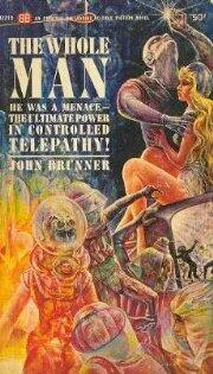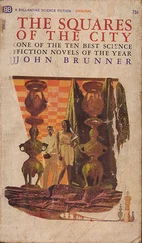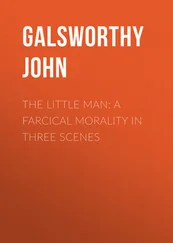“You’re going to be all right.”
The words were spoken aloud, and subtly reinforced by a mental indication of confidence in the future. Howson opened his eyes to see a calm face above him. It was rather a good-looking face, in fact, and it wore a smile.
He licked his lips and tried to croak an answer, but his mind was ahead of his voice.
“Don’t bother trying to talk. I’m the telepathist — I’m Danny Waldemar.”
Awareness of bandages on his head and arms: a confused question.
“You’re all right! We gave you prothrombin the moment we realized you were bleeding so badly. All the cuts are scabbing over.” And abruptly, a switch to telepathy: You’re a miracle, do you know that? You could have died a hundred times over, from accidents!
He hadn’t done so, and therefore the point seemed irrelevant. He pursued a more important matter.
What’s going to happen to me? The question was blurred with fear and vague images of human vivisection.
“Don’t be afraid.” Waldemar spoke aloud, slowly, with emphasis; “Nothing can be done to you that you don’t understand. Nothing! From now on and for ever you can always know what anyone is doing, and why!”
Of — course! Howson felt a sort of smile come to his twisted face, and at its reassuring appearance Waldemar chuckled and got to his feet.
Load you aboard the “copter now. Get you somewhere and attend to those cuts properly.
Wait…
Waldemar checked, expressing attention.
The girl. She’s deaf and dumb. I was all she had — all that mattered in her life. If you take me you’ve got to take her too. It’s not fair.
Surprised, Waldemar pursed his lips. There was a momentary sensation of listening, as though he had made a mental investigation and been satisfied.
“Yes, why not? It’s absurd that anyone should be left like that nowadays — her brain’s uninjured, and that means she can have an artificial voice, artificial ears… Why not? We’ll take her with us by all means.”
Howson closed his eyes. He was fairly certain that the suggestion, had been planted in his mind by Waldemar, but he didn’t care. The only thing that mattered was that he was content with what had happened, and the future no longer made him terrified.
A mental chuckle came to him from Waldemar, and then he slept.
Howson sat staring dully out over Ulan Bator, thinking how much its condition resembled his own. He could sense its collective mood; for the rest of his life he would be unendingly subject to a kind of emotional weather, the sum of the individual minds surrounding him.
The city had been a rather dowdy, provincial-feeling one, even though it was the capital of a country. The changing pattern of the world — transport, commerce, communications—had hurried it into modern times; now it was a place of fine white towers and broad avenues, and travellers of all kinds came. Amid the turmoil of change, old people could do no more than wonder what had hit them, and long without enthusiasm for the simpler past.
So, too, he had been overtaken by a change he didn’t want, and believed he would only accept if other changes were found to be possible — changes he did desire.
It wasn’t that they had not been kind to him. They had gone to a great deal of trouble. Apart from the immensely thorough medical examinations their specialists had given him — and this hospital at Ulan Bator was the main therapy centre for WHO in all Asia, with staff commensurate — there were such minor luxuries as this chair in which he sat. In was subtly designed to accommodate him, Gerald Howson; it was smaller than usual, and the padding matched his deformities. The bed was designed for him, too, and the equipment in the adjacent bathroom, and everything.
But he didn’t want that. It was the same as being helped on to a crowded bus: a hateful reminder of his handicap.
There came a tapping at the door. Automatically he turned his attention to the visitor — no, visitors. So far he had accepted almost no formal training in the use of his talent, but there were trained telepathists on the permanent staff of the hospital, and merely being close to them had increased his control and sensitivity. He couldn’t help admiring them — who could? But so far he had learned nothing about them which reconciled him to being what they were not: a runt, and deformed into the bargain.
He said, both aloud and telepathically, in a tone tinged with weariness, “All right, come in.”
Pandit Singh was the first to enter. A burly man running to fat, with a neatly combed beard and sharp bright eyes, he was the head of therapy A — responsible, in other words, for all neurological and psychological treatment undertaken at the hospital. People, including Howson, liked him; Howson had been impressed by the fact that his sympathy was always coloured by determination to do something if possible. Too many people’s pity was soured by relief that they at least were physically whole.
Along with him had come Danny Waldemar and one of the staff neurologists, a woman named Christine Bakwa, whom Howson had met previously in one of the many examination rooms he had been taken to. She wasn’t good at disciplining her verbalized thoughts, the most easily accessible to a casual telepathic “glance’, and even before she entered the room Howson had learned from her most of what Singh had to say.
None the less, he made a curt gesture indicating that they should sit down, and turned his own chair on its smoothly-operating castors to face Singh.
“Morning, Gerry,” Singh said. “I hear your girl-friend was around to see you. How is she? I meant to have a word with her, but I was too busy.”
“She’s getting on well,” Howson said. She was; she was becoming used to the impulses given off by the trembler coils deft surgeons had inserted in her ears, and the bio-activated plastic vocal cords that had replaced her own. There was promise that she would stumble into possession of a musical, if hesitant, speaking voice once she had completed training.
Howson slapped down envy at her childish joy, and added the question to which he already sensed the answer.
“And how about me?’
Singh looked at him steadily. He said, “You know I have bad news for you. I couldn’t conceivably hide the fact.”
“Spell it out,” Howson said stubbornly.
“Very well,” Singh sighed. He gestured to Christine Bakwa, and she gave him a folder of papers from a portfolio she was carrying. Selecting the topmost enclosure, he continued, “To begin with, Gerry, there’s the question of your grandfather — your mother’s father.”
“He died long before I was born,” Howson muttered.
“That’s right. Were you ever told why he died so young?”
Howson shook his head. “I guess I knew my mother didn’t like talking about it, so I never pushed the point to an answer.”
“Well, she must have known. He was what they call a hemophiliac — in other words, a bleeder, whose normal supply of thrombic enzyme was absent. He ought never to have had children. But he did, and through your mother you inherited the condition.”
“I told you this,” Danny Waldemar put in. “When we were taking you aboard the helicopter — remember? I told you we’d given you prothrombin, which is an artificial clotting agent. Your scratches and bruises have always taken a long time to heal, haven’t they? A serious hemorrhage — a nose-bleed, say — would have put you in hospital for a month, and quite possibly would have killed you. You’re lucky to be alive.”
Am I? Howson kept the counter on the telepathic level, but it was so bitter Waldemar flinched visibly.
Читать дальше












